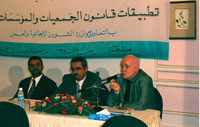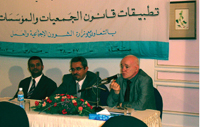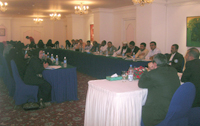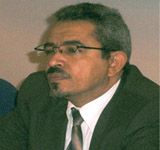
Civil society vs. government: A battle over legislation [Archives:2007/1038/Reportage]
April 2 2007
 |
 |
 |
 |
One of the great concerns of civil society and activists in Yemen is the rule of law. This has been displayed repeatedly at various meetings and workshops, whether it concerns laws related to discrimination against women, elections and referendum, the press code or sales tax laws. Recently, further legislation was added to the list of disputed regulations and this is the Associations and Foundations Law No. 1 for 2001.
According to Ministry of Social Affairs statistics, approximately 5,400 community associations and civil society organizations are registered with the ministry, one-third of which are inactive. This was the main reason it withheld licenses for 1,500 civil society associations last year. The ministry decided that it must take a closer look at how civil society is working in Yemen and hence, consider amending the Associations Law.
Each registered association receives annual government support once it has completed a year since its establishment. The ministry licenses such organizations once they have 21 or more members, an internal charter and a statement of purpose ensuring that it's a non-profit organization.
The law also requires clear financial statement of funding sources and how the money is being spent. Article 6 of the law designates the Ministry of Social Affairs as the monitoring body supervising the activities of any association. Such associations aren't allowed to hold any political activities or get involved in electoral campaigning, etc.
Deputy Minister of Social Affairs Ali Saleh Abdullah commented on this point in his keynote address at a workshop organized by the Civic Democratic Initiatives Support Foundation, known as CDF. “Political affiliation ruins development work when it interferes with society activities. What we need is civil society work without political party interference,” he noted.
In the presence of Ministry of Social Affairs representatives and assistance from legal experts, CDF gathered a number of civil society organizations last week to discuss the law and potential amendments.
“This is the first step. Next, we'll hold similar workshops in five other governorates. The point is to create public interest from the stakeholders themselves and allow them to give their input and feedback to the Ministry of Social Affairs before any amendments are forwarded to Parliament,” CDF Chairman Abdulmajid Al-Fahd explained.
From what the deputy minister said in his keynote address, the ministry seems quite understanding; however, amendments are on their way, as he noted, “What's needed now are amendments to the law to reform civil society development work in Yemen. The government acknowledges civil society's role in development and that they are vital partners in development.”
Why wouldn't they be, if in 2001 alone, according to the ministry itself, civil society organizations and charities contributed more than YR 5 billion to national development?
The workshop was a sequel to a similar one CDF organized last December in cooperation with the International Center for Non-profit Laws. Recommendations from that workshop resulted in legal evaluation by two experts of the law.
Lawyers Ahmed Al-Washali and Fathya Abdulwase' studied the law and came up with a proposed list of amendments, including eliminating some articles and incorporating additional ones.
One problem the legal team highlighted in Article 7 of the law for organizations was duplicate supervision of associations of a specific nature, such as cultural associations, whereby in addition to the Ministry of Social Affairs' role, the Culture Ministry had a supervising role as well.
“The problem is that we could only view this law from a legal point of view and identify points of conflict or restrictions. We don't have any field expertise on the problems faced by civil society in real life. This is why the input from the associations was very important in order to make our suggestions legitimate,” Abdulwase' pointed out.
The Associations Law is relatively recent, as it's just over six years old and hasn't been adequately examined in practice since then. Participants from civil society organizations and charities explained that they were unaware of many of the regulations and, in some cases, when trying to avail privileges entitled to them by law, such as exemption from taxes or electricity and water bill subsidies as per Article 40, they were denied these rights by tax collectors or power authorities.
In response to complaints by the associations, Abdulqadir Mohammed, director of the Social Affairs Ministry's Civil Society Financial and Administration Monitoring Department, said, “As a government body, we can't complain on your behalf about the malpractices of other governmental bodies. You have the right and flexibility to take up your issues legally; in fact, I envy you this freedom.”
He admitted that there are shortcomings in the ministry, but at the same time, many associations abuse their position for personal interest. A number of ministry consultants currently are studying the amendments, which revolve around 18 technical observations on the law, especially regarding separating regulations for associations from those of organizations.
An internal charter was created in 2004 to complement the law and clarify some of its ambiguous points; however, according to Mohammed, it wasn't enough, thus, amendments to the actual law are required.
Legal expert Al-Washali was apprehensive about what type of amendments the government will suggest, saying, “There are certain clauses in the current law that allow the Ministry of Social Affairs to govern association finances as per Article 4 of the law, and this could limit the freedom civil society organizations have in their work. In fact, how to use an association's money comes under personal ownership rights.”
The problem with new amendments is that they mostly come to restrict freedoms rather than allow more flexibility, Al-Fahd commented. “It's sometimes better to leave laws as they are if the alternative is worse,” he noted.
The Ministry of Social Affair's participation in the workshop displayed an interest in what civil society has to say. Although most amendments to Yemeni laws actually happen indoors without much public participation, even from the stakeholders themselves, the ministry promised to look into the proposed amendments and consider them when drafting the new law.
——
[archive-e:1038-v:14-y:2007-d:2007-04-02-p:report]


